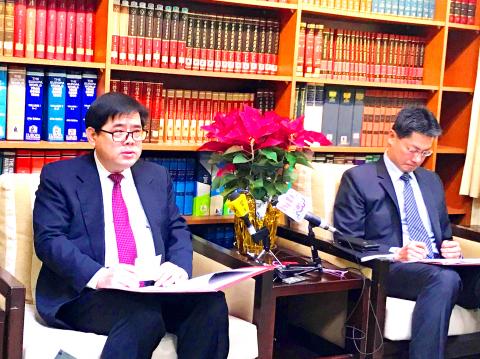The Presidential Office yesterday thanked the US for briefing Taiwan in advance on its latest National Security Strategy report and for reiterating its commitment to the Taiwan Relations Act in the document.
US President Donald Trump’s administration unveiled the report on Monday morning in Washington, mentioning Taiwan in its section on the Indo-Pacific region.
Presidential Office spokesman Sidney Lin (林鶴明) said that the US briefed Taiwan on the report in Taipei on Monday afternoon.

Photo: Peng Wan-hsin, Taipei Times
The guiding principles outlined in the US report as part of a strategy to bring about a free and open Indo-Pacific region, including promotion of free and fair trade and joining forces with its allies to deter threats, are “in line with our policy to pursue peace and stability in the region,” Lin said.
“We thanked the US for its prior briefing and its firm commitment to the Taiwan Relations Act,” he said.
As a member of the international community, Taiwan is committed to deepening cooperation and relationships with regional partners to contribute to the peace, stability and welfare of the region, Lin added.
The Ministry of Foreign Affairs expressed optimism about future Taiwan-US relations, saying the reference to the Taiwan Relations Act shows that Trump realizes the strategic importance of Taiwan in the Asia-Pacific region.
The government has paid close attention to and is highly interested in Trump’s “Indo-Pacific” strategy, which was proposed by the US president during his first trip to Asia last month, Department of North American Affairs Director-General Remus Chen (陳立國) said.
“We will continue to seek to understand what policies the US plans to adopt to carry out the initiative. We also hope to strengthen bilateral cooperation with Washington on various aspects under this new strategic framework,” Chen said.
Asked what role Taiwan could play in Trump’s Indo-Pacific strategy, Chen said that although the government is still conducting evaluations, it would not sit on the sidelines.
“Taiwan is situated in a coveted strategic location in East Asia and has consistently contributed to the maintenance of regional peace. As one of the stakeholders, it is impossible for us to sit on the sidelines when a major regional strategy is being formed,” he said.

Right-wing political scientist Laura Fernandez on Sunday won Costa Rica’s presidential election by a landslide, after promising to crack down on rising violence linked to the cocaine trade. Fernandez’s nearest rival, economist Alvaro Ramos, conceded defeat as results showed the ruling party far exceeding the threshold of 40 percent needed to avoid a runoff. With 94 percent of polling stations counted, the political heir of outgoing Costa Rican President Rodrigo Chaves had captured 48.3 percent of the vote compared with Ramos’ 33.4 percent, the Supreme Electoral Tribunal said. As soon as the first results were announced, members of Fernandez’s Sovereign People’s Party

MORE RESPONSIBILITY: Draftees would be expected to fight alongside professional soldiers, likely requiring the transformation of some training brigades into combat units The armed forces are to start incorporating new conscripts into combined arms brigades this year to enhance combat readiness, the Executive Yuan’s latest policy report said. The new policy would affect Taiwanese men entering the military for their compulsory service, which was extended to one year under reforms by then-president Tsai Ing-wen (蔡英文) in 2022. The conscripts would be trained to operate machine guns, uncrewed aerial vehicles, anti-tank guided missile launchers and Stinger air defense systems, the report said, adding that the basic training would be lengthened to eight weeks. After basic training, conscripts would be sorted into infantry battalions that would take

GROWING AMBITIONS: The scale and tempo of the operations show that the Strait has become the core theater for China to expand its security interests, the report said Chinese military aircraft incursions around Taiwan have surged nearly 15-fold over the past five years, according to a report released yesterday by the Democratic Progressive Party’s (DPP) Department of China Affairs. Sorties in the Taiwan Strait were previously irregular, totaling 380 in 2020, but have since evolved into routine operations, the report showed. “This demonstrates that the Taiwan Strait has become both the starting point and testing ground for Beijing’s expansionist ambitions,” it said. Driven by military expansionism, China is systematically pursuing actions aimed at altering the regional “status quo,” the department said, adding that Taiwan represents the most critical link in China’s

‘REALLY PROUD’: Nvidia would not be possible without Taiwan, Huang said, adding that TSMC would be increasing its capacity by 100 percent Nvidia Corp CEO Jensen Huang (黃仁勳) on Saturday praised and lightly cajoled his major Taiwanese suppliers to produce more to help power strong demand for artificial intelligence (AI), capping a visit to the country of his birth, where he has been mobbed by adoring fans at every step. Speaking at an impromptu press conference in the rain outside a Taipei restaurant, where he had hosted suppliers for a “trillion-dollar dinner,” named after the market capitalization of those firms attending, Huang said this would be another good year for business. “TSMC needs to work very hard this year because I need a lot